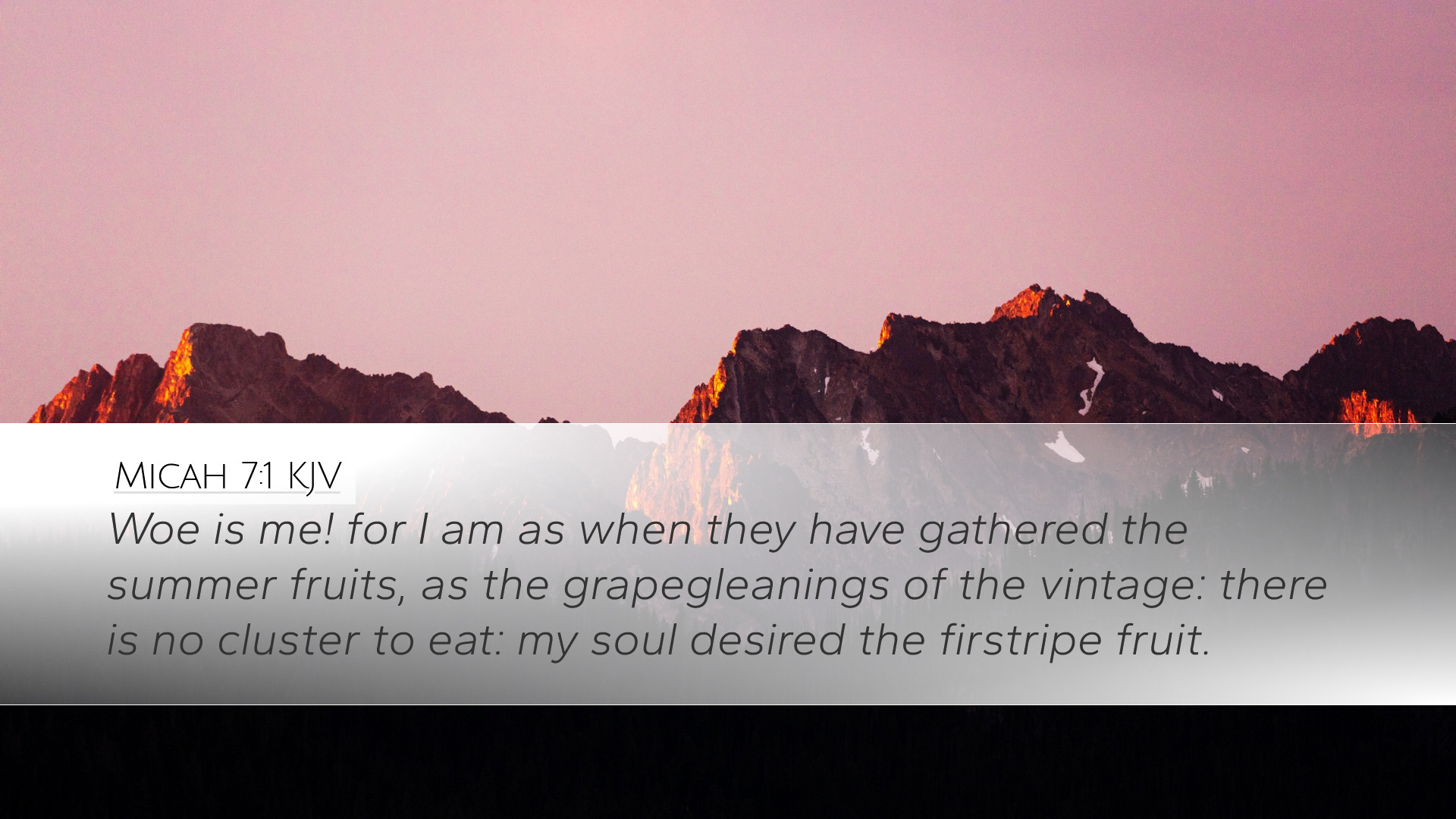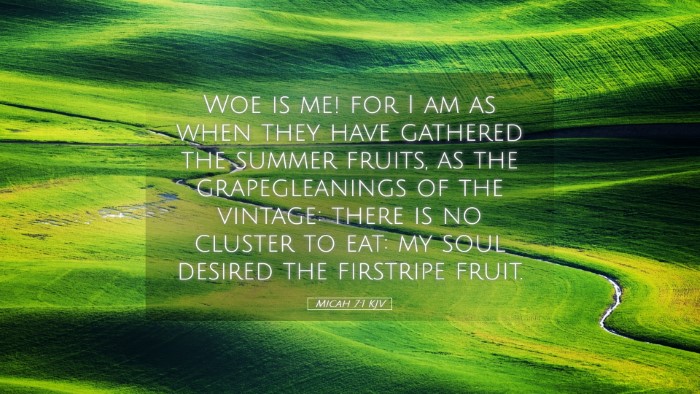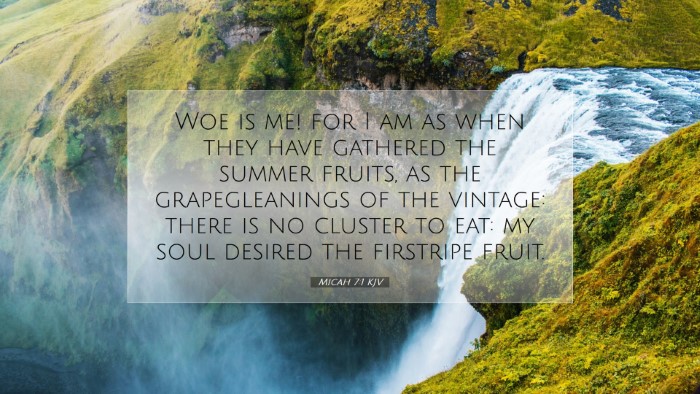Old Testament
Genesis Exodus Leviticus Numbers Deuteronomy Joshua Judges Ruth 1 Samuel 2 Samuel 1 Kings 2 Kings 1 Chronicles 2 Chronicles Ezra Nehemiah Esther Job Psalms Proverbs Ecclesiastes Song of Solomon Isaiah Jeremiah Lamentations Ezekiel Daniel Hosea Joel Amos Obadiah Jonah Micah Nahum Habakkuk Zephaniah Haggai Zechariah MalachiMicah 7:1
Micah 7:1 KJV
Woe is me! for I am as when they have gathered the summer fruits, as the grapegleanings of the vintage: there is no cluster to eat: my soul desired the firstripe fruit.
Micah 7:1 Bible Commentary
Micah 7:1 - Commentary
Verse Text: "Woe is me! for I am as when they have gathered the summer fruits, as the grape gleanings of the vintage: there is no cluster to eat: my soul desired the firstripe fruit."
Introduction
The verse from Micah 7:1 presents a vivid metaphor of desperation and desolation. Micah, a prophet during the latter part of the 8th century BC, conveys his profound sorrow over the spiritual and moral decline in Israel. This commentary synthesizes insights from esteemed public domain sources to illuminate the theological implications and historical context of this poignant lamentation.
The Context of the Passage
Historical Background: Micah prophesied during tumultuous times characterized by social injustice, idolatry, and a general turning away from God. The northern kingdom of Israel had already fallen, and the southern kingdom of Judah faced impending judgment.
Thematic Overview: The themes of judgment and lament permeate Micah's prophecies. In chapter 7, Micah articulates the sorrow of the faithful remnant amidst widespread corruption.
Exegesis of Micah 7:1
The prophetic cry, "Woe is me!" indicates profound distress. Here, Micah likens himself to a harvest left desolate:
- Imagery of Gathering: The metaphor of gathering summer fruits illustrates unfulfilled expectations. Just as a harvest signifies abundance, its absence speaks to spiritual emptiness.
- Grape Gleanings: The reference to the gleaning illustrates a time when the faithful are scarce and the fruitful community is lost, aligning with the biblical practice of leaving behind remnants for the poor.
Spiritual Insights
- Moral Decline: Micah’s lament reveals the deep moral and spiritual decay of society. This serves as a warning about the consequences of abandoning God's ways.
- Personal Reflection: The prophet’s cry serves as a model of the anguish felt by those who yearn for righteousness amidst pervasive sin.
Commentaries
Matthew Henry
Henry emphasizes the sense of loss and despair in Micah's expression. He notes that the lack of spiritual fruit implies judgment upon the people. The phrase "my soul desired the firstripe fruit" signifies the longing for righteousness and God's favor, which has become scarce.
Albert Barnes
Barnes draws attention to the metaphor of summer fruits, associating it with a strong sense of urgency and hopelessness. He elucidates how this longing reflects a thirst not just for earthly sustenance but for genuine spiritual nourishment. This desire underpins the grief Micah expresses for his people
.Adam Clarke
Clarke elaborates on the cultural implications of gleaning and the season of harvest. He outlines how Micah's imagery is deeply rooted in the agrarian society, where farmers looked forward to the harvest with hope. The absence of clusters to eat symbolizes not only scarcity but also highlights God’s withdrawal from Israel due to their unfaithfulness.
Theological Implications
- The Nature of God’s Judgment: The cry of lament reflects the seriousness of divine judgment. God’s displeasure is a central theme in Micah, requiring a return to covenant faithfulness.
- Hope in Despair: Even amid despair, Micah's lament paves the way for hope. A faithful remnant exists that yearns for restoration and righteousness.
- Call to Repentance: This verse serves a dual purpose as both a warning and a call for introspection. It invites the reader to reflect on their own faithfulness.
Conclusion
Micah 7:1 embodies the prophet’s cry of anguish over the moral decay surrounding him. The imagery highlights the stark reality of spiritual barrenness. Through synthesizing insights from Matthew Henry, Albert Barnes, and Adam Clarke, we understand the deep implications of this lamentation. The glimmer of hope amidst despair signifies the enduring desire for renewal and the promise of God's mercy for those who remain faithful.
Further Reflection
As pastors, students, theologians, and Bible scholars engage with this verse, consider its call to personal and corporate repentance. Reflect on the status of spiritual fruitfulness in your lives and communities, and earnestly seek to cultivate a return to the foundational truths of the faith.


